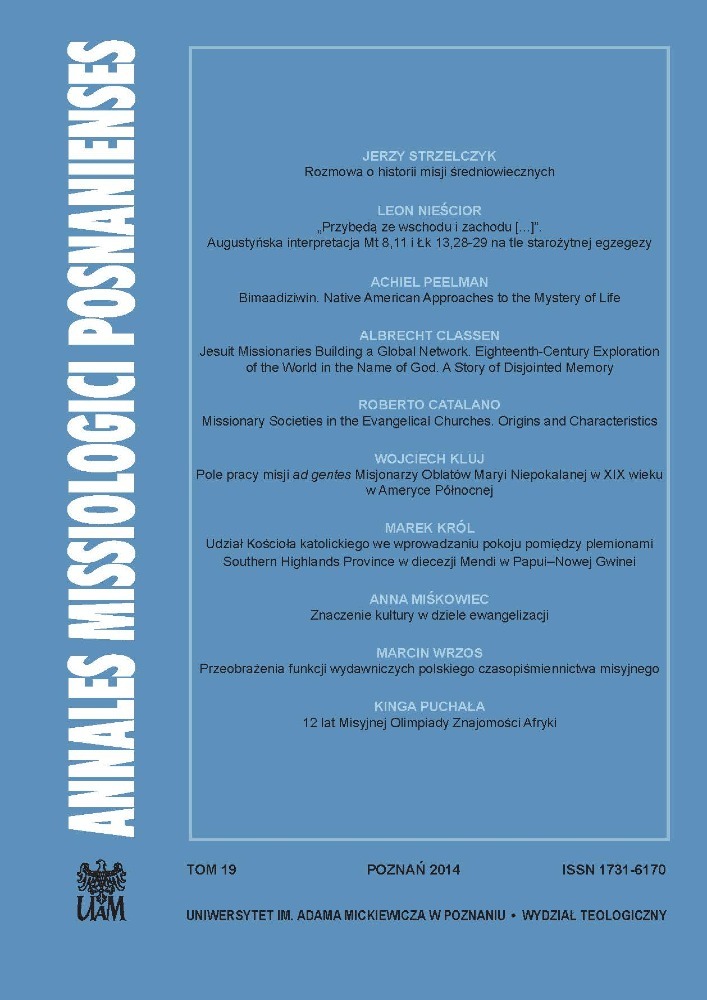Abstract
The author describes several social and peace-making initiatives which were undertaken in the last decades by the Catholic organizations active within the diocese of Mendi in Papua New Guinea. The country gained independence in 1975, but remained culturally diversified. The basic identity for most of the citizens is still related to the tribal level. Political conflicts, corruption, abuse of alcohol and narcotics resulted in the past decades in several outbursts of violence among tribes of the Southern Highlands Province. Since the central government was unable to answer this challenge, the Catholic organizations of the Mendi diocese became very much involved in the peace-making process and other social initiatives. Activities of two Catholic organizations are described in more detail, namely the Diocesan Development Secretariat and the Justice and Peace Group, which have succeeded in mediations among several tribes.References
Alpers P., Gun-Running in Papua New Guinea: from arrows to assault weapons in the Southern Highlands, A publication of the Small Arms Survey, http://www.smallarmssurvey.org/fileadmin/docs/C-Special-reports/SAS-SR05-Papua-New-Guinea.pdf [dostęp 2.10.2014].
Byrne T., Integral development, Lusaka 1983.
Byrne T., Working for Justice and Peace, Lusaka 1988.
Dworecki T., Z kraju kamiennej siekier, Warszawa 1975.
Hope A., Timmel S., Training for Transformation, Rugby 1984.
http://pacificinstitute.anu.edu.au/outrigger/2014/05/12/pngs-elections-the-most-expensive-in-the-world-and-getting-worse/ [dostęp 12.05.2014].
http://www.catholic-hierarchy.org/diocese/dmndi.html [dostęp 2.10.2014].
International Narcotics Control Board, Report of the International Narcotics Control Board for 1997, United Nations, New York 1998.
Kruczek Z., Mission models employed throughout the history of the Catholic Church in Papua New Guinea, w: „Cywilizacja i kultura: Współczesne problemy”, red. J. Zimny, Stalowa Wola–Sandomierz 2007, s. 39.
McDonald D., Cannabis in Papua New Guinea, http://www.pngaa.net/Library/Cannabis.htm. [dostęp 22.05.2014].
Papua New Guinea, Socioeconomic Context, Substance abuse, Papua New Guinea, pdf., http://search.who.int/search?q=alcohol+in+Papua+New+Guinea&ie=utf8&site=who&client=_en_r&proxystylesheet=_en_r&output=xml_no_dtd&oe=utf8&getfields=doctype, [dostęp 14.05.2014].
Robie D., Tongue-tied in PNG, „Papua New Guinea Post-Courier”, 8.04.1994, s. 31.
Ton R., Report from 1996-2002, Diocesan Development Secretariat, Mendi 2002, s. 4.
Tyszkowski S., Program rozwoju kultury fizycznej w Papui Nowej Gwinei (Prowincja Southern Highlans) Według wskazań ONZ oraz projektów własnych, Gdańsk 2008, s. 10.
United Nations, The empowerment of rural women and their role in poverty and hunger eradication, development and current challenges, New York 2012, http://www.un.org/womenwatch/daw/csw/csw56/panels/
panel2-Lilly-Be-Soer.pdf, [dostęp 23.02.2012].
License
Copyright (c) 2014 Marek Król

This work is licensed under a Creative Commons Attribution-NoDerivatives 4.0 International License.
PUBLISHED WORK ARE LICENSED UNDER A CREATIVE COMMONS:
Before 2006 all published texts are copyrighted.
Authors
Authors of texts accepted for publication in the journal Annales Missiologici Posnanienses are required to complete, sign and return to the editorial address an agreement to grant free license to works, with an obligation to grant CC sublicense.
According to the agreement, the authors of the texts published in the journal Annales Missiologici Posnanienses grant to Adam Mickiewicz University in Poznan a non-exclusive and royalty-free licencji Creative Commons Attribution-NonCommercial-NoDerivatives 4.0 International (CC BY-NC-ND 4.0) license and allow sublicensing under the same conditions.
The authors retain the rights to further freely dispose of the work.
Users
Interested internet users are entitled to use works published from 2021 onwards in Annales Missiologici Posnanienses under the following conditions:
- Attribution - the obligation to provide with the distributed work, information, about the authorship, title, source (links to the original work, DOI) and the license itself;
- Non-commercial use - you should not use the work for commercial purposes;
- Without creating derivative works - the work must be preserved in its original form, e.g. translations, adaptations may not be distributed without the author's permission.
Interested Internet users are entitled to use works published between 2006 and 2020 in Annales Missiologici Posnanienses under the following conditions:
- acknowledgment of authorship - the obligation to provide with the distributed work, information, about the authorship, title, source (links to the original work, DOI) and the license itself;
- without creating derivative works - the work must be preserved in its original form, e.g. translations, adaptations cannot be distributed without the author's consent.
Other
Adam Mickiewicz University of Poznan retains the right to the journal as a whole (layout, graphic form, title, cover design, logo, etc.).


